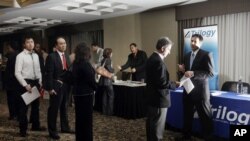Asian-Americans suffer the highest rates of long-term unemployment of any group in the United States, according to a recent study issued by the Economic Policy Institute in Washington, D.C.
While the overall Asian-American unemployment rate sits at 7.1 percent, lower than the national average of 8.1 percent, the latest data show that just over half of unemployed Asian-Americans have been without work for longer than six months. That is up from 48.7 percent in 2010.
For unemployed whites, 42.4 are long-term unemployed, for blacks it is 49.9 percent and for Hispanics, 39.8 percent.
Asian-Americans are often portrayed in the media or movies as highly educated super-achievers. But the reality, according to this study, is that even the most educated are losing out on job opportunities.
Asian-Americans with a college degree had an unemployment rate of 6.4 percent in 2011, while whites with the same education level had an unemployment rate of 4.3 percent, the study found.
Marlene Kim, the study’s author, said several factors are driving the phenomenon.
First, she said, geography plays a role in the joblessness, as nearly one-third of all Asian-Americans live in California, which is struggling with a 10.9 percent overall unemployment rate.
For foreign-born Asian-Americans, many have linguistic challenges, and employers may prefer U.S. citizens over permanent residents.
A final factor could be racially driven, she said.
“There's evidence that there might be this bias against Asians with higher education because they’re perceived as being foreign born, lacking language skills, being different or not socially similar,” said Kim, an economics professor at the University of Massachusetts in Boston.
“That might be driving the higher long-term unemployment rates in a weak job market when employers have a choice in who they hire. It seems like we can get the busboy jobs, the jobs that seem right for immigrants, but it's harder to get the higher-level jobs.”
Kim said she was uncertain how to weigh each factor to explain Asian-Americans high rate of long-term unemployment, but plans to study that next.
What the study makes clear is that Asian-Americans are suffering under the economic downturn, said Tuyet Le, the executive director of the Asian-American Institute in Chicago.
“It challenges policy makers to rethink the model minority stereotype, and begin assessing the very real, racially-motivated barriers that hamper Asian-Americans from becoming economically successful,” she said in a statement.
Shirley Lin, an attorney with the Asian-American Legal Defense and Education Fund, said these barriers may push many Asian-Americans into low-wage industries where she says they often are forced to work overtime with no pay.
Increased attention to the statistics in the study, Lin said, can break down preconceived notions about Asian-Americans.
“Statistics such as these will dismantle widespread myths that Asian-Americans do not need assistance in achieving social, academic, or professional success," said Lin.
While the overall Asian-American unemployment rate sits at 7.1 percent, lower than the national average of 8.1 percent, the latest data show that just over half of unemployed Asian-Americans have been without work for longer than six months. That is up from 48.7 percent in 2010.
For unemployed whites, 42.4 are long-term unemployed, for blacks it is 49.9 percent and for Hispanics, 39.8 percent.
Asian-Americans are often portrayed in the media or movies as highly educated super-achievers. But the reality, according to this study, is that even the most educated are losing out on job opportunities.
Asian-Americans with a college degree had an unemployment rate of 6.4 percent in 2011, while whites with the same education level had an unemployment rate of 4.3 percent, the study found.
Marlene Kim, the study’s author, said several factors are driving the phenomenon.
First, she said, geography plays a role in the joblessness, as nearly one-third of all Asian-Americans live in California, which is struggling with a 10.9 percent overall unemployment rate.
For foreign-born Asian-Americans, many have linguistic challenges, and employers may prefer U.S. citizens over permanent residents.
A final factor could be racially driven, she said.
“There's evidence that there might be this bias against Asians with higher education because they’re perceived as being foreign born, lacking language skills, being different or not socially similar,” said Kim, an economics professor at the University of Massachusetts in Boston.
“That might be driving the higher long-term unemployment rates in a weak job market when employers have a choice in who they hire. It seems like we can get the busboy jobs, the jobs that seem right for immigrants, but it's harder to get the higher-level jobs.”
Kim said she was uncertain how to weigh each factor to explain Asian-Americans high rate of long-term unemployment, but plans to study that next.
What the study makes clear is that Asian-Americans are suffering under the economic downturn, said Tuyet Le, the executive director of the Asian-American Institute in Chicago.
“It challenges policy makers to rethink the model minority stereotype, and begin assessing the very real, racially-motivated barriers that hamper Asian-Americans from becoming economically successful,” she said in a statement.
Shirley Lin, an attorney with the Asian-American Legal Defense and Education Fund, said these barriers may push many Asian-Americans into low-wage industries where she says they often are forced to work overtime with no pay.
Increased attention to the statistics in the study, Lin said, can break down preconceived notions about Asian-Americans.
“Statistics such as these will dismantle widespread myths that Asian-Americans do not need assistance in achieving social, academic, or professional success," said Lin.




